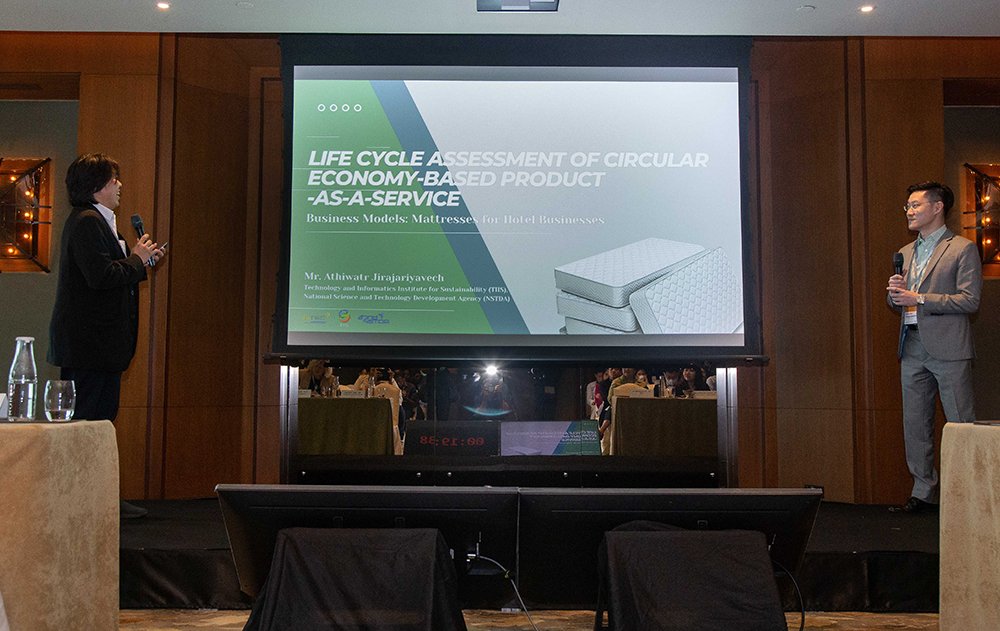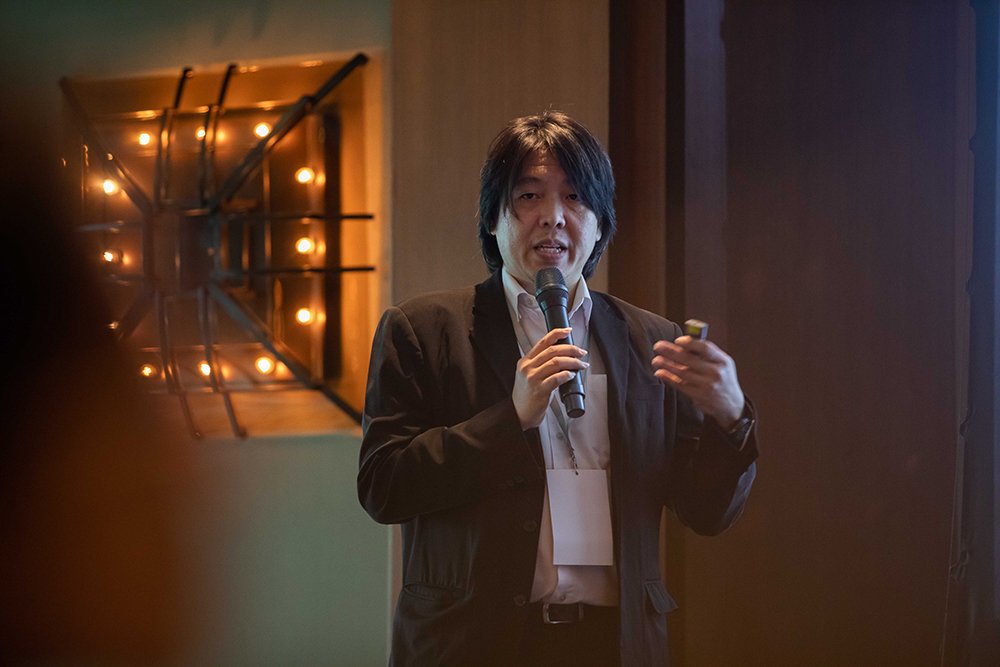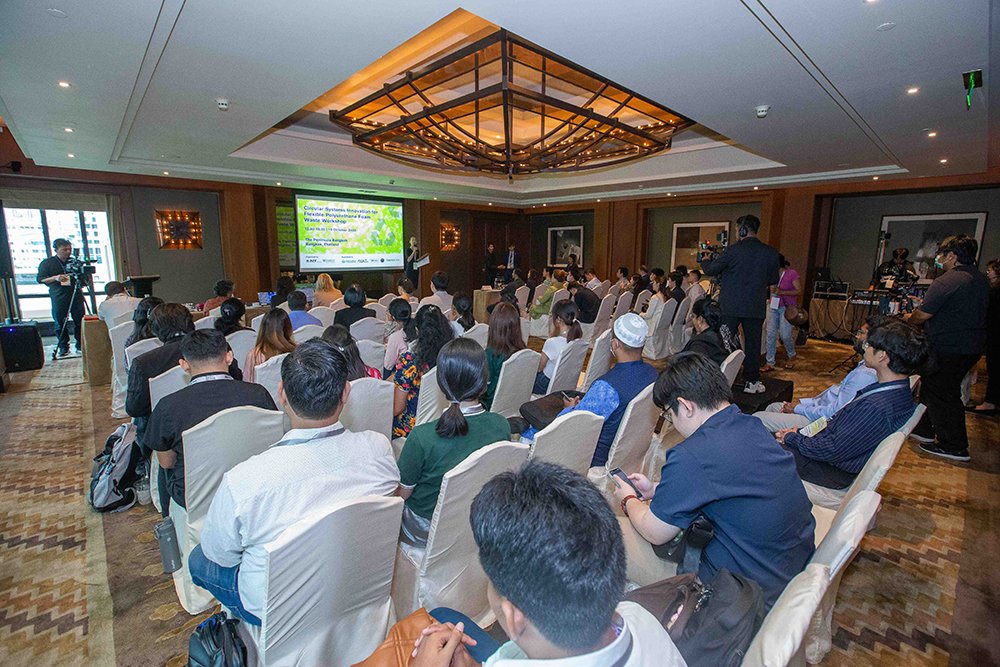nornnorn’s and Thailand’s mattress industry’s inaugural LCA
On October 19, 2023, at the Circular Systems Innovation for Flexible Polyurethane Foam Waste Workshop 2023 (CSI-PW 2023) held in Bangkok, Athiwatr Jirajariyavech, a researcher from the Technology and Informatics Institute for Sustainability (TIIS), National Science and Technology Development Agency (NSTDA), unveiled the comprehensive findings of the 20-month-long Life Cycle Assessment (LCA) of Circular Economy-based Product-As-A-Service Business Models: Mattresses for Hotel Businesses project. Commissioned by nornnorn, the groundbreaking study highlights the potential reductions in greenhouse gas emissions, pollution and waste resulting from the production, use and disposal of mattresses that nornnorn could lead to over the coming years.
LCA is a systematic analysis of the potential environmental impacts of products (or services) during their entire life cycle, from the extraction of the natural resources that form their raw materials to the logistics that deliver the materials into the production processes to the use of the products to their end-of-life disposal. In the study, the use of mattresses in the hotel industry are divided into five different Scenarios under a timeframe of ten years, namely:
Scenario 1: A high quality mattress with a lifespan of ten years is used and totally landfilled at the end of its life;
Scenario 2: A high quality mattress with a lifespan of ten years is used and disposed of at the end of its life in accordance with the disposal methods employed by the 354 hotels and 50 private and state-run waste management centres in eight key economic areas in Thailand (Bangkok, Chiang Mai, Chiang Rai, Pattaya, Phuket, Krabi, Nakorn Ratchasima and Khon Kaen) surveyed as a part of the study;
Scenario 3: A high quality mattress with a lifespan of ten years is used and recycled at the end of its life in accordance with nornnorn’s business model;
Scenario 4: 3.33 low quality mattresses with a lifespan of three years are used and totally landfilled at the end of their life;
Scenario 5: 3.33 low quality mattresses with a lifespan of three years are used and disposed of in accordance with the result of the aforementioned survey.
The high quality mattress used as the functional unit in the assessment is a 107 x 198cm. Springmate Pocket Coil Heritage PT mattress manufactured by Somphol Bedding and Mattress Industry Co., Ltd. The low quality mattress is assumed to be that of the same size generally available in the market in Thailand.
According to the aforementioned survey, at the end of their lives 50% of the mattresses (by weight) are landfilled; 30% sold, donated or sent on for reuse; 17% recycled; and 3% incinerated. (With nornnorn at least 62% of the mattresses (steel springs, polyurethane foams, etc.) would have been recycled and prevented from entering landfills or incinerated.)
The environmental impact of the five Scenarios are assessed with the Netherlands’s ReCiPe Midpoint and ReCiPe Endpoint methods, taking into account 17 different environmental impacts. It is found that the three most significant impacts in all the five Scenarios are global warming, fine particulate matter formation (air pollution) and human non-carcinogenic toxicity. The impacts arise from the following phases of the mattresses’ life cycles:
Sources of the three most significant environmental impacts under the five Scenarios
When compared the three impacts under the five Scenarios, it can be ascertained that nornnorn stands to help reduce the global warming, air pollution and human non-carcinogenic toxicity impacts by at least 31%, 28% and 24% respectively (see Scenarios 2 and 3).
Comparisons of the degrees of the three most significant environmental impacts under the five Scenarios
Additionally, the project also uses the Material Circularity Indicator (MCI), a measurement of a product’s circularity conceptualised by the Ellen MacArthur Foundation, to calculate the degrees of circularity under the three Scenarios. The study finds that the MCI values in Scenarios 1, 2 and 3 are 0.10, 0.32 and 0.41 respectively, signalling that nornnorn may help improve the circularity of mattresses by at least 28%, for the higher the MCI value, the greater the circularity.
Conducted by TIIS between May 2021 and January 2023, the project was supported by a grant from Thailand's Office of National Higher Education Science Research and Innovation Policy Council (NXPO) through the Programme Management Unit for Competitiveness (PMU-C) and Somphol Bedding and Mattress Industry Co., Ltd. It is the first-ever LCA for Thailand’s mattress industry.
Watch the announcement of the results.*
*Some of the results have been updated since the announcement.





